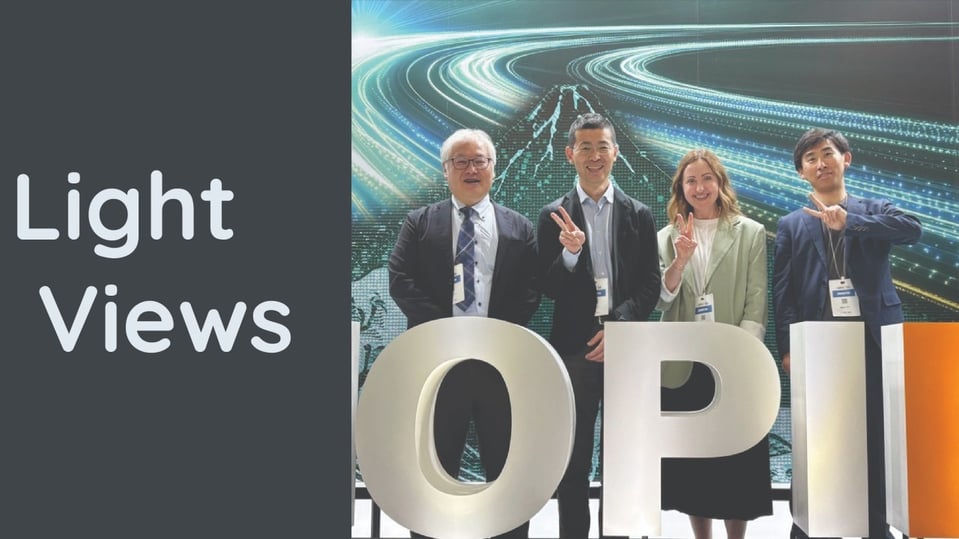
Blogs
Light Views: Examining Industry Developments at Japan’s OPIE 2025
Edition 8 | May 2025
Light Views newsletter brings you monthly insights from inside the AR/VR industry, published by OptoFidelity. Welcome to Edition 8.
Subscribe to Light Views Newsletter on LinkedIn
Listen as a Podcast
In late April, OptoFidelity’s Growth Marketing Director, Arlinda Sipilä, spoke at OPIE ’25, Japan’s largest exhibition for optics and photonics-related industries. The event brought together experts in optical systems of differing types, from space-related technology to AR/VR.

Arlinda’s talk described four new developments in the AR/VR space, which we’ve outlined below.
1. Manufacturers are moving to volume production, as consolidations and alliances are formed
OptoFidelity is supporting its customer base moving to mass production of XR devices, in particular, AR smart glasses. As we look across the whole market landscape, many developments are pointing to consolidations in the market.
The market for augmented reality (AR) is expanding quickly because of developments in hardware, software, and AI integration. “The impact of 5G is also noticeable in these developments,” noted Sipilä. “5G is poised to transform AR and VR by reducing latency and increasing throughput, improving the overall UX of devices.”
Additionally, groups in the sector such as the AR Alliance, are available to organisations wanting to benefit from collaboration. Many of the largest players are joining forces, demonstrating consolidation and maturity in the market. Here are a few examples:
- Anduril takes over Microsoft's $22 billion US Army headset program [Source: Reuters]
- Samsung and Google are cooperating to launch a device, as Google’s Android XR will be launched on a Samsung headset, in a development known as Project Moohan [Source: KED Global]
- Meta and Rayban have joined forces on affordable smartglasses, with Meta’s higher-end product, Orion, due out in the near future.

2. Lower-cost smartglasses are increasing consumer interest
Manufacturers are introducing less expensive smartglasses, making them more accessible to a broader audience. Features like real-time translation, hands-free media capture, and voice assistants add value to these devices for the consumer. This market is noted for its competitive landscape, as both large brands and challengers are making inroads.

3. Enhancements to materials impacting the performance of diffractive waveguides
At present, most manufacturers are using glass substrates for the production of diffractive waveguides used in AR/XR devices. The market is noticing a shift towards newer, innovative materials. At present, high refractive index glass is being replaced by lightweight polymer waveguides, and some manufacturers are looking to the future to implement silicon carbide. As the lens substrate becomes lighter, it can offer an improved form factor for the whole device.


4. Emerging trends in optical metrology
As production increases for XR devices, metrology is increasingly embedded in every step of the manufacturing process to increase yield and to improve quality control. Metrology provides real-time monitoring and feedback, reducing variability and defects.
“We’re also seeing increased specialization of metrology controls to meet the precise requirements of manufacturers. This means that they’re focusing on specific use cases, rather than a one-size-fits-all approach,” said Sipilä.
These more specific metrology tests can include:
- Color Uniformity – Optimized for applications where color accuracy is crucial, to ensure consistent and reliable visual experiences
- Image Sharpness & MTF Optimization – Ideal for high-resolution needs, enhancing clarity and detail recognition
- Brightness Enhancement – Designed for outdoor visibility under varying lighting conditions

Summary: Producing smartglasses with high yield and cost control is a challenge
Mark Zuckerberg has commented, “Building AR glasses is one of the hardest hardware challenges ever tackled.” The complex engineering of AR glasses requires precision in all elements: from the camera, sensors, processors, speakers, display and so on. A balance must be struck between a cost-effective form factor that delivers an excellent UX.

Metrology offers control during the manufacturing process by testing quality in every step of the process. It goes beyond giving an understanding of the basic process parameters. Attention to every detail can help to: map out and understand interactions between all critical parameters; and create a holistic process and failure analysis.
When manufacturers are producing devices in the thousands or millions, timing is crucial: late investments in production quality cost exponentially more in the long term. Metrology can improve yield by catching problems early.

The cost of bad yield:
- Delays production ramp-up
- Causes rework
- Binning
- Wasted parts
- Bad process capability
- All produced samples need to be measured
- High production volumes eventually lead to intolerable financial costs

On the contrary, early investment in metrology:
- Leads quickly to good process capability
- Enables the manufacturer to monitor and improve process
- Enables the use of sampling plans; not all samples need to be measured
References:
"Display Measurement Solutions For Augmented and Virtual Reality," Konica Minolta.
"Near-Eye Display Measurement for AR/VR Headsets," AZoOptics.
"Enabling Display Measurement within AR/VR Headsets," Automate.org.
Written by


